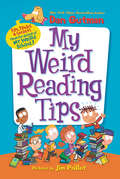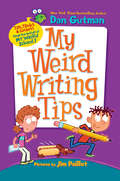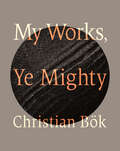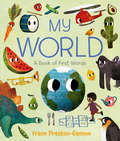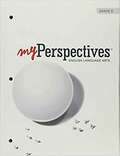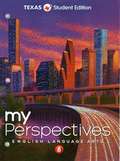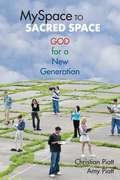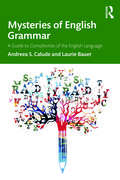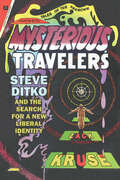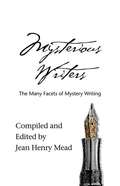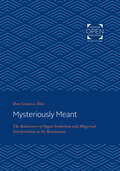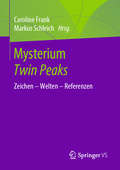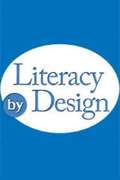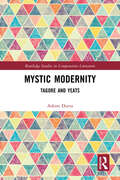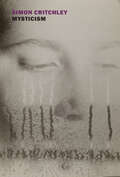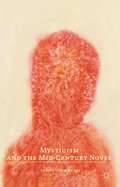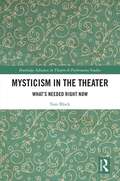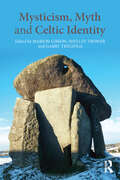- Table View
- List View
My Weird Reading Tips: Tips, Tricks & Secrets by the Author of My Weird School (My Weird School)
by Dan GutmanWith more than 23 million books sold, the My Weird School series really gets kids reading! The ability to read critically is an essential skill vital to success in school. For example, do you know what point of view means? Or how to “read” a picture? Can you tell fact from opinion? Well, whether you’re a kid who's just starting to read by yourself or a future librarian—or both!—this book of tips and activities to improve your reading comprehension skills is so much fun you’ll forget you’re learning! Filled with exercises to help young readers practice skills like identifying context clues and a story’s main idea, plus practical tips and tricks from bestselling author Dan Gutman, this book will help you become the best reader in the history of the world!
My Weird Writing Tips
by Dan GutmanThe ability to put thoughts into writing is an essential skill vital to success in school—from elementary school through college. Bestselling author Dan Gutman helps kids master this important skill with his fun, informative writing guide, My Weird Writing Tips. Dan offers tricks for spelling hard words, understanding the difference between similar words like “its” and “it’s,” and conquering grammar stumbling blocks like commas and apostrophes. He also teaches readers how to write an engaging story, in line with the grades 2–5 Common Core goals for writing a narrative. With illustrated appearances from A. J. and Andrea, stars of his bestselling My Weird School series, and with his trademark wacky sense of humor, Dan makes learning the writing and storytelling basics so fun kids will forget they’re learning.
My Works, Ye Mighty
by Christian BökMy Works, Ye Mighty expands upon the conceptual literature of Christian Bök, particularly his ongoing project, entitled The Xenotext. Based upon work conducted during his tenure as the Writer-in-Residence at Athabasca University, this essay addresses the concept of "scale" in poetry, meditating on this topic with an abundance of imagery; moreover, his essay appears, alongside an epic poem, especially written by him for this publication.
My World: A Book of First Words
by Frann Preston-GannonA beautiful and entertaining visual catalog for toddlers—including things that go, cute fruits and veggies, undersea creatures, and more!There's no end to the fun in finding and naming each object in these chockablock spreads! Beautiful birds, adorable mommy and baby animals, colorful clothing, musical instruments, and more fill each page, with objects labeled and grouped by theme. A fun, gorgeous visual dictionary for the very youngest of readers.
MyPerspectives English Language Arts 2017
by Prentice-Hall StaffMYPERSPECTIVES ENGLISH LANGUAGE ARTS 2017 STUDENT EDITION GRADE 08
MyPerspectives English Language Arts Grade 6
by Prentice HallEnglish Language Arts Textbook for Grade 6
MyPerspectives English Language Arts: Grade 8
by Pearson EducationmyPerspectives is a new English language arts curriculum for Grades 6–12 that values the perspective of the learner, collectively and individually, and provides next-gen learning experiences that promote higher achievement and develop the competencies needed for college and career readiness. Interactive learning blends print and technology in a student-centered, teacher-inspired classroom. This dynamic program creates an interactive, engaging, and relevant learning environment through readings, meaningful activities, and purposeful performance tasks. In this Grade 8 Texas Student Edition, you will come up with your own perspectives on essential questions, engage in thoughtful discussions with your peers, make choices in what you read, and maybe, even, re-examine your own thinking as a result!
MySpace to Sacred Space: God for a New Generation
by Christian Piatt Amy PiattRecently, MySpace.com has become one of the most-visited Web sites in the world. With millions of young users, this one site has made a giant impact on youth pop culture in just a matter of a few years. At the same time, themes of spirituality pervade our lives. From television to film and popular literature, theology is a burgeoning enterprise in popular culture. In contrast, most churches and denominations are built on eighteenth-century principles, and are fighting to remain relevant to young members. The collective fear is that if the church doesn't adapt to this new generation, they will be left behind forever. Christian and Amy Piatt believe church leaders have a responsibility to stay tuned in to the values and vernacular employed by the younger generations. MySpace to Sacred Space combines first-hand accounts with case studies from people both within and outside the church. Far from tolling the death knell for the established church, MySpace to Sacred Space is an affirming, hopeful look at the ever-growing need for what the Christian faith can offer the world. Much of the relevance for the twenty-first century church can be found in our oldest traditions. By reconnecting with our past and by setting time aside for God and for one another, we have an opportunity to create sacred space and time wherever we are.
Myperspectives English Language Arts 2017 Student Edition Grade 10
by Prentice HallmyPerspectives™ English Language Arts is a student-centered learning environment where you will analyze text, cite evidence, and respond critically about your learning. You will take ownership of your learning through goal-setting, reflection, independent text selection, and activities that allow you to collaborate with your peers. Each unit of study includes selections of different genres-- including multimedia--all related to a relevant and meaningful Essential Question. As you read, you will engage in activities that inspire thoughtful discussion and debate with your peers allowing you to formulate, and defend, your own perspectives.
Mysteries of English Grammar: A Guide to Complexities of the English Language
by Laurie Bauer Andreea S. CaludeDespite a history of hundreds of years of research analysing aspects of English grammar, there are still open problems which continue to baffle language researchers today. Such ‘grammar mysteries’ arise for a number of reasons: because the language is changing; because different speakers of the language adhere to distinct norms and thus introduce and maintain variation in the system; because there are differences between the grammar of spoken and written English. This book illuminates some of the complexities of the subject, the areas where new discoveries await and why it matters. Through a series of accessible and engaging case studies on various aspects of grammar, from multiple negation to possession, the authors present grammar as an intellectual challenge. This book brings out into the open questions about language usage to which we still do not have good answers in a bid to make variation overt and to revel in the mystery of the English language. Both aimed at the interested general reader and the beginning student of English language and linguistics, this is a fresh take on grammar.
Mysterious Travelers: Steve Ditko and the Search for a New Liberal Identity (Great Comics Artists Series)
by Zack KruseSteve Ditko (1927–2018) is one of the most important contributors to American comic books. As the cocreator of Spider-Man and sole creator of Doctor Strange, Ditko made an indelible mark on American popular culture. Mysterious Travelers: Steve Ditko and the Search for a New Liberal Identity resets the conversation about his heady and powerful work. Always inward facing, Ditko’s narratives employed superhero and supernatural fantasy in the service of self-examination, and with characters like the Question, Mr. A, and Static, Ditko turned ordinary superhero comics into philosophic treatises. Many of Ditko’s philosophy-driven comics show a clear debt to ideas found in Ayn Rand’s Objectivism. Unfortunately, readers often reduce Ditko’s work to a mouthpiece for Rand’s vision. Mysterious Travelers unsettles this notion. In this book, Zack Kruse argues that Ditko’s philosophy draws on a complicated network of ideas that is best understood as mystic liberalism. Although Ditko is not the originator of mystic liberalism, his comics provide a unique window into how such an ideology operates in popular media. Examining selections of Ditko’s output from 1953 to 1986, Kruse demonstrates how Ditko’s comics provide insight into a unique strand of American thought that has had a lasting impact.
Mysterious Writers
by Larry Karp Tim Maleeny Beverle Graves Myers Mary Reed Eric Mayer Jean Henry MeadMystery novels are published in a number of subgenres to satisfy the tastes of every reader. Not only do we have the traditional mystery--also known as the cozy--there are historicals, suspense and thriller novels, crime, police procedurals, private eyes and senior sleuths (also known as "geezer lit"). Then there are medical thrillers, romantic suspense as well as science fiction mysteries and the niche novels that cover endless subjects. The mystery writers interviewed here have written articles about various aspects of publishing, including writing techniques, marketing, promotional advice and their opinions on the current state of the publishing industry. Carolyn Hart, bestselling author of the Henrie O and Death on Demand series, talks about her new protagonist, Bailey Ruth Raeburn, who returns to earth as a ghost to anonymously solve mysteries. Jeffrey Deaver's varied careers prepared him to write insightful as well as thrilling novels, John Gilstrap explains why some bestselling novelists hold down fulltime jobs, and Rick Mofina provides sixteen great tips for writing thriller novels. A number of Canadian and UK authors share their publishing views as well as comparing books from their own countries with those of the U.S. suspense novelist Paul Johnston writes from his native Scotland as well as his home in Greece while Tim Hallinan divides his time between Thailand, Cambodia, and southern California, writing much of his work in Bangkok cafés. Gillian Phillip writes YA mystery novels from Barbados and her native Scottish highlands, and international airline pilot Mark W. Danielson composes his suspense novels during layovers in various parts of the world, while S. J. Bolton thrills us with snakes and other creepy creatures in and from the British Isles. English native Carola Dunn writes historical mysteries about her countrymen as does Rhys Bowen, who writes about historical English royals. Other historical novelists include Larry Karp, who provides us with the history of Ragtime music and the people who made the genre popular during its heyday and Beverle Graves Myers delves into operatic mysteries set in 18th century Venice. The work of several writing teams inhabits this book, including Eric Mayer and Mary Reed, who pen historical mysteries. Mark and Charlotte Phillips write suspense novels, and Morgan St. James and her sister Phyllice Bradner collaborate on humorous mysteries. Jeff Cohen, Tim Maleeny, and Carl Brookins also add humor to their mysterious plots, so prepare to laugh when you open their books. There are police procedurals, medical thrillers and romantic suspense novelists represented here as well as niche mysteries designed for readers who love dogs, scrapbooking, zoos, the Arizona desert, space shuttles, weight-loss clinics, actors, designer gift baskets and other specialty subjects. Nonfiction books about the mystery genre round out this eclectic collection with Edgar winner E.J. Warner, Agatha winner Chris Roerden, Lee Lofland, Jeffrey Marks, and small press publishers Vivian Zabel and Tony Burton. The advice offered here is invaluable to fledgling writers, so pull up a comfortable chair and begin the mysterious tour of nearly every subgenre.
Mysteriously Meant: The Rediscovery of Pagan Symbolism and Allegorical Interpretation in the Renaissance
by Don Cameron AllenOriginally published in 1971. In Mysteriously Meant, Professor Allen maps the intellectual landscape of the Renaissance as he explains the discovery of an allegorical interpretation of Greek, Latin, and finally Egyptian myths and the effect this discovery had on the development of modern attitudes toward myth. He believes that to understand Renaissance literature one must understand the interpretations of classical myth known to the sixteenth and seventeenth centuries. In unraveling the elusive strands of myth, allegory, and symbol from the fabric of Renaissance literature such as Milton's Paradise Lost, Allen is a helpful guide. His discussion of Renaissance authors is as authoritative as it is inclusive. His empathy with the scholars of the Renaissance keeps his discussion lively—a witty study of interpreters of mythography from the past.
Mysterium Twin Peaks: Zeichen – Welten – Referenzen
by Caroline Frank Markus SchleichDer Sammelband bringt verschiedene Zugänge und Kontexte zu Twin Peaks zusammen und greift dabei auch die besonderen produktions- und rezeptionsästhetischen Spezifika der Serie auf. Das Spektrum der Beiträge umfasst ganz unterschiedliche Themenbereiche: Genremix, Transaktualität, komplexe narrative Strukturen, Traum und Traumhaftigkeit, Geschlechts- und Identitätskonzepte, extremer Fankult, visuelle Ästhetik, akustische Dimensionen, postmoderne Verweiskultur und nicht zuletzt die Frage danach, welche anderen Quality TV-Serien durch Twin Peaks erst möglich wurden.
Mystery at Marin Marsh (Rigby Literacy by Design)
by Denise M. Jordan Carol StutzNIMAC-sourced textbook
Mystic Modernity: Tagore and Yeats (Routledge Studies in Comparative Literature)
by Ashim DuttaThis is a transnational and bilingual investigation of the cross-fertilisation of mystical religiosity and modern poetical imagination in the works of the Bengali poet Rabindranath Tagore and the Irish poet W. B. Yeats. The book demonstrates how their commitments to transnational mysticism deeply form and inform the modernist literary projects of these poets as well as their understanding of cultural modernity. Although its primary interest lies in their poetry and poetics, the monograph also includes some of their relevant prose works. This study begins with a close look at and around the phase of 1912-1913, when Yeats and Tagore met over the collection of the latter’s English translations of his spiritual verses, Gitanjali, and took mutual interests in each other’s works and cultural significances. The monograph then expands on both sides of that phase, selectively covering the whole career of the poets in its exploration of their parallel mystic-modern cultural-poetical projects.
Mysticism
by Simon CritchleyA probing, inspiring exploration of mysticism not as religious practice but as a mode of experience and way of life by one of the most provocative philosophical thinkers of our time.Why mysticism? It has been called &“experience in its most intense form,&” and in his new book the philosopher Simon Critchley poses a simple question to the reader: Wouldn&’t you like to taste this intensity? Wouldn&’t you like to be lifted up and out of yourself into a sheer feeling of aliveness, both your life and those of the creatures that surround you? If so, it might be well worthwhile trying to learn what is meant by mysticism and how it can shift, elevate, and deepen the sense of our lives. Mysticism is not primarily a theoretical issue. It's not a question of religious belief but of felt experience and daily practice. A rough and ready definition of mysticism is that it is a way of systematically freeing yourself of your standard habits, your usual fancies and imaginings so as to see what is there and stand with what is there ecstatically. Mysticism is the practical possibility of the achievement of a fluid openness between thought and existence. This is a book about trying to get outside oneself, to lose oneself, while knowing that the self is not something that can ever be fully lost. It is also a book about Julian of Norwich, Anne Carson, Annie Dillard, T.S. Eliot, and Nick Cave. It shows how listening to music can be secular worship. It is a book full of learning, puzzlement, pleasure, and wonder. It opens the door to mysticism not as something unworldly and unimaginable, but as a way of life.
Mysticism and the Mid-Century Novel
by James ClementsThis book argues that many of the mid-twentieth century's significant novelists were united by a desire to return the increasingly interior novel to ethical engagement. They did not seek morality in society, politics or the individual will, but sought to unveil a transcendent Good by using techniques drawn from the canon of mystical literature
Mysticism in the Theater: What’s Needed Right Now (Routledge Advances in Theatre & Performance Studies)
by Tom BlockMysticism in the Theater introduces theater makers to the power and possibility of using historical mystical ideas to influence all aspects of a production. Historical mysticism represents ideas developed by recognized spiritual thinkers in all religions and time periods: individuals who stilled their ego, and perceived the unity of all, hidden within the apparent multiplicity of existence. This unique manner of spiritual inlay allows theatrical presentations to find the height of artistic expression: art at the intersection of our historical moment and the eternal. This study introduces theater makers to the history of mystical inspiration within performance work and develops strategies for inserting mystical ideas into their productions. The book ties this model into theatre’s history, as mystical ideas and quotes have been inserted into productions from Greek theatre through Shakespeare and into the present day. This book explores how teachings and ideas of specific historical mystical thinkers might influence all aspects of contemporary theatrical productions including writing, directing, acting, stagecraft/set design, lighting design, costume design, sound design, and choreography.
Mysticism, Myth and Celtic Identity
by Shelley Trower Marion Gibson Garry TregidgaMysticism, Myth and Celtic Identity explores how the mythical and mystical past informs national imaginations. Building on notions of invented tradition and myths of the nation, it looks at the power of narrative and fiction to shape identity, with particular reference to the British and Celtic contexts. The authors consider how aspects of the past are reinterpreted or reimagined in a variety of ways to give coherence to desired national groupings, or groups aspiring to nationhood and its ‘defence’. The coverage is unusually broad in its historical sweep, dealing with work from prehistory to the contemporary, with a particular emphasis on the period from the eighteenth century to the present. The subject matter includes notions of ancient deities, Druids, Celticity, the archaeological remains of pagan religions, traditional folk tales, racial and religious myths and ethnic politics, and the different types of returns and hauntings that can recycle these ideas in culture. Innovative and interdisciplinary, the scholarship in Mysticism, Myth and Celtic Identity is mainly literary but also geographical and historical and draws on religious studies, politics and the social sciences. Thus the collection offers a stimulatingly broad number of new viewpoints on a matter of great topical relevance: national identity and the politicization of its myths.
